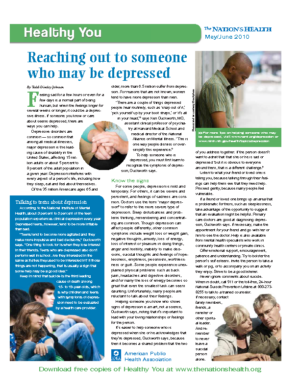
Depressive disorders are so common that among all medical illnesses, major depression is the leading cause of disability in the United States. Depression interferes with every aspect of a person’s life, including how they sleep, eat and feel about themselves.
“There are a couple of things depressed people hear routinely, such as snap out of it, pick yourself up by your boot straps, or it’s all in your head”, says Ken Duckworth, MD, assistant clinical professor of psychiatry at Harvard Medical School and medical director of the National Alliance on Mental Illness. “This is one way people dismiss or oversimplify this experience.”
 In the United States, depressive disorders affect 15 million adults or about 5 percent to 8 percent of the adult population in a given year. More than 6.5 million Americans ages 65 and older suffer from depression.
In the United States, depressive disorders affect 15 million adults or about 5 percent to 8 percent of the adult population in a given year. More than 6.5 million Americans ages 65 and older suffer from depression.
To help someone who is depressed, you must first learn to recognize the symptoms of dression. In the May/Jun 2010 issue of The Nation’s Health published by the American Public Health Association, Teddi Dineley writes about the signs of depression.
For some people, depression is mild and temporary. For others, it can be severe and persistent, and feelings of sadness are common. Sleep disturbances and problems thinking, remembering and concentrating are common. Though depression can affect people differently, other common symptoms include weight loss or weight gain, negative thoughts, anxiety, loss of energy, loss of interest or pleasure in doing things, anger and hostility, inability to make decisions, suicidal thoughts and feelings of hopelessness, emptiness, pessimism, worthlessness or guilt.
What You Can Do to Help Someone Suffering from Depression
Helping someone you know who shows signs of depression is an art, not a science; it’s important to lead with your loving relationships or feelings for the person. It’s easier to help someone who is depressed when she or he acknowledges that they’re depressed because then it becomes a shared problem that the two of you address together. If the person doesn’t want to admit that she or he is sad or depressed—but it is obvious to everyone around them—that is a different challenge.
Listen to what your friend or loved one is telling you, because talking through their feelings can help them see that they need help. Proceed gently, because many people feel vulnerable. If a friend or loved one brings up an area that is problematic for them, such as sleeplessness, take advantage of the opportunity to suggest that an evaluation might be helpful. Healthcare professionals are good at diagnosing depression; if necessary, make the appointment for your friend and go with her or him to see a professional.
Care Matters specializes in helping people to address, manage, and overcome problems with depressive disorders. If you or someone you know may be suffering from depression, you can contact us by calling 248-691-9034 or by sending an e-mail to mycare@caremattersllc.com.

